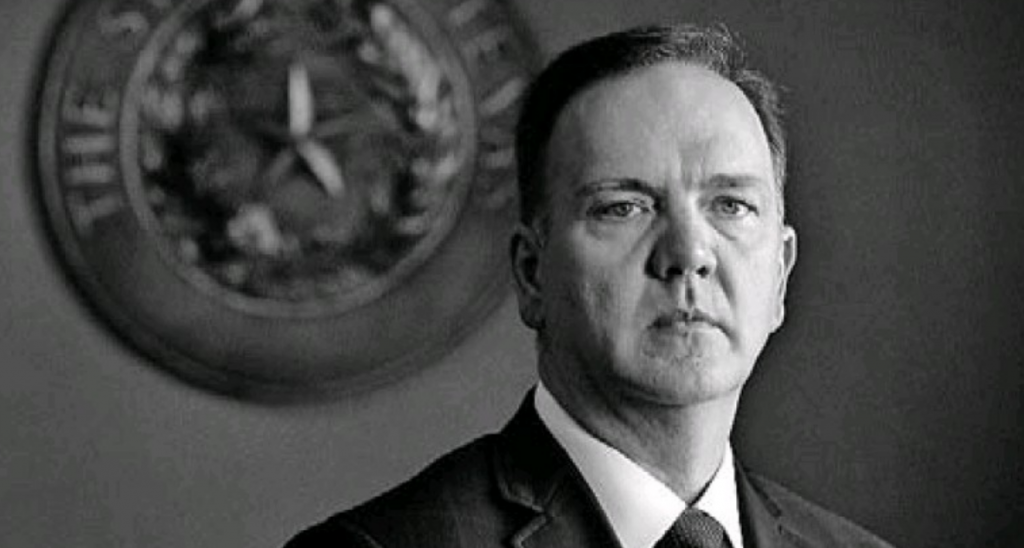Original Article by The Dallas Morning News @Sharonfgrigsby

Judge John Roach Jr., shown in his chambers at the Collin County Courthouse in Mckinney, and his wife, Laura, an attorney who specializes in family law mediation, wrote a book on how to avoid ugly, expensive divorce battles.
Divorce is not a business transaction. It’s the death of the family. The last thing most estranged couples need is a court fight.
John Roach Jr., a state district judge in Collin County, understands that. But his efforts to point out a cheaper, gentler option only got him a slap on the wrist.
He deserved a pat on the back.
Roach co-wrote the book
Divorce in Peace in 2016, which advised couples seeking divorce to use alternative dispute resolution rather than the courthouse.
Two anonymous complainers, almost certainly political foes, took issue with Roach’s involvement in the book and its promotion. They set in motion a judicial review that ended with Roach receiving the lightest possible sanction. His punishment? A little bad publicity from a public admonition.
Lost in all the tut-tutting over whether Roach crossed an ethical line is a more important story.
Divorce court is a battleground; that’s the essence of litigation. If you aren’t already hurting when you walk through the lawyer’s door that first time, just wait for it — discovery, depositions, temporary orders, requests for disclosures and inventory.
No matter your congenial intentions going in, you are now trying to win. Each
lawyer is dead-set on getting the best deal for the client — more money, more time with the kids, more property, more everything.
And it’s a very public battle, all on the timeline of the courts and with strict adherence to standards within the family code — regardless of what’s best for an individual couple.
Speaking, sadly, from personal experience, I can affirm that the two parties rarely come to divorce with the same perspective. One side likely has been through the anger, accepted reality and is ready to move on. The other is hurt, in disbelief and still believing the marriage can be saved. The shame and self-loathing leaves you unable to even think straight.
The ensuing legal battle can shred not just the divorcing couple, but family, friends, neighborhoods, schools and even communities.
Roach, who has been on the bench for the 296th District Court in Collin County since 2007, sees these ugly, expensive fights play out weekly. That’s why he wrote the book with his wife, Laura, an attorney who specializes in mediation in family law cases. The couple also created an online referral service and set up a Divorce in Peace website.
A Special Court of Review found he was “lending the prestige of his office and exploiting his position as a judge to further the private interests of himself and his wife.”
Whatever.
John and Laura mostly were trying to get the word out because, Roach said in a Tuesday interview: “It was the right thing to do — not to make money but to help people.”
The judicial review didn’t find a problem with Roach’s authoring the book, but rather with the related for-profit business and website operated by his wife. While the book is still available, those operations have been shut down, the judge said.
Roach’s assessment that “no good deed goes unpunished” may have been flip, but it was also true.
Bringing more attention to non-adversarial mediation to keep families and kids out of the court system makes a lot of sense. It’s not the solution for everyone, but it’s often a more personal, humane option worth exploring.
The courts don’t lend themselves to understanding, forgiveness or reconciliation. In good mediation, it’s the exact opposite: to help each party see its role and even put both individuals into the other’s shoes.
Mediation is private, the parties maintain control, and direct communication is allowed. Sometimes you just avoid a massive train wreck going this route; other times real change comes in relationships and feelings. Most important, healing happens more quickly — and with a lot less cash doled out.
Roach is a judge with a lot of examples of compassionate and innovative decision-making to his credit. This is a guy who established the first regional court for veterans and who keeps up with the juveniles whose cases he hears.
He’s also dealt with thousands of divorce cases over the years, and too often they go like this:
The couple before him had amassed several million dollars from their business. She was the marketing whiz and he was the technical brains.
Roach advised the pair to go to mediation: “If you fight this out in court, we’re going to go around and around. Only the lawyers will win here . … Two years from now, it’ll just be the three of us. And you’ll have nothing to fight over but debts because the money will be gone and the lawyers will be gone.”
The couple didn’t listen to Roach. Lo and behold, about three years later, after countless court appearances, they were penniless, had lost all their contracts — and their divorce lawyers had withdrawn from the case. “I was splitting up the debts they were left with,” Roach recalled.
Even in the many cases that don’t end that dramatically, the emotional and financial damage is — more often than not — devastating. That’s why I hope that the controversy over Divorce in Peace results in people giving it a read.
Putting divorce courts out of business is a pretty good little idea.





